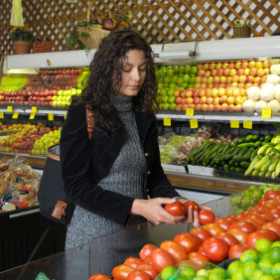
By Karen J Quan
In a perfect world, we would build our own gardens and grow the freshest, healthiest produce to eat. But in reality, we rely on supermarkets to provide us with healthy, affordable, convenient options. And while we are told to always buy fresh, organic produce, what about the frozen aisle? How do frozen foods and veggies stack up to their fresher counterparts? Since March is Frozen Food Month, we decided to do a little digging and answer the simple question: fresh vs. frozen, which is healthier?
The United States Department of Agriculture recommends we eat 5-9 servings of fruits and vegetables every day. But not all your servings have to come from fresh produce. Despite the bad rap that frozen food is processed like junk food, the way in which vegetables are picked and preserved can sometimes make it healthier than the fresh varieties. In March 1998, the Food and Drug Administration (FDA) released a statement declaring that “frozen fruits and vegetables generally are nutritionally comparable to raw fruits and vegetables.” In addition, the statement says that “like raw fruits and vegetables, [frozen produce] can contribute significantly to a healthy diet and to achieving compliance with dietary guidelines.”
Go Fresh
Head to your local supermarket and have a field day picking and choosing from the wonderful assortment of fresh produce that arrives every week.
Don’t Forget Frozen
How are frozen veggies harvested and packaged? While fresh produce is often picked early to give it time to ripen while en route to the supermarket, frozen foods are collected when it is at its most ripe stage, providing consumers the most nutrition, Dr. Gene Lester of the USDA Agricultural Research Center in Weslaco, Texas told “Eating Well.” And while the vegetables are blanched prior to packaging to eliminate harmful bacteria, the majority of the food’s nutritional value remains intact. Just be sure to steam your frozen veggies rather than boiling or cooking them, since re-heating can lessen the health benefits when eaten.
How Does Canned Goods Stack Up?
Similar to frozen veggies, canned foods are picked and packed when at their peak of freshness. But unlike their frozen friends, salt is often added to preserve the flavor and prevent spoilage in order to maintain a long shelf life. Check the label and grab varieties that have no salt added or are low in sodium.
So don’t shy away from the freezer aisle. Head to your nearest supermarket, stock up on your favorite frozen produce and start loading up on healthy veggies today!
Sources:
http://www.ers.usda.gov/publications/aib-agricultural-information-bulletin/aib792-2.aspx
http://www.fda.gov/ohrms/dockets/98fr/032598c.pdf
http://www.bidmc.org/YourHealth/HolisticHealth/HealthMythsCenter.aspx?ChunkID=160561
http://www.nutrition411.com/articles/vegetable-debate-fresh-frozen-or-canned
http://news.health.com/2013/10/17/reasons-nutritionist-buys-frozen-fruits-veggies/
http://www.livestrong.com/article/71064-fresh-versus-frozen-produce-which-healthier/